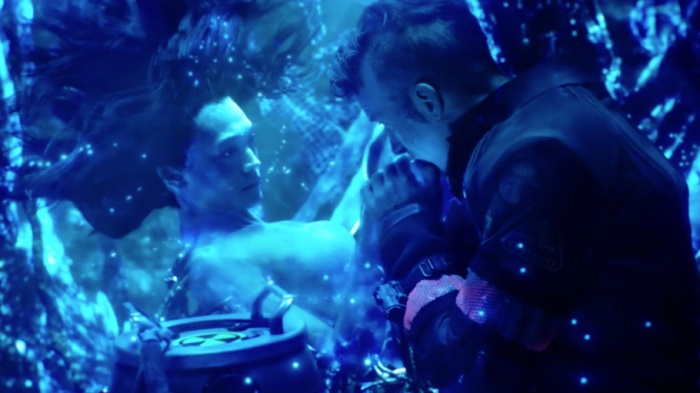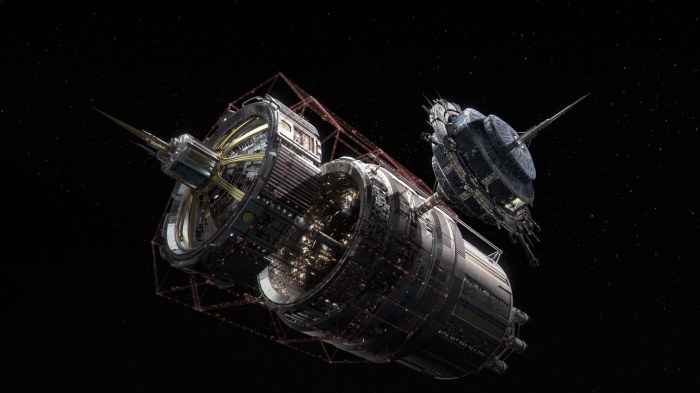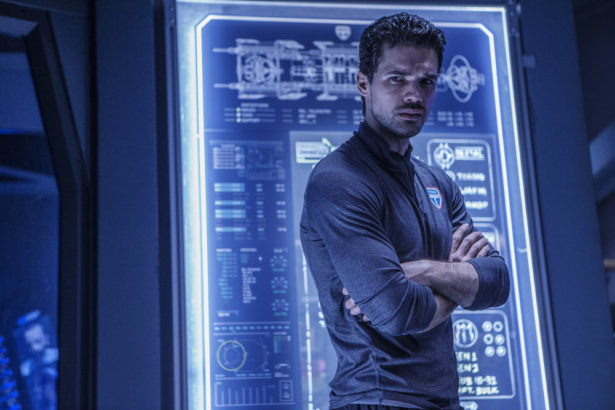Daniel Abraham and Ty Franck’s Leviathan Wakes (2011), penned under the pseudonym James S.A. Corey, is the Hugo award winning first novel in The Expanse series. This is must read science fiction. It’s page turning and easy to read. The plot is easy to follow but needs a little bit of explanation for the points that follow so I’ll do a brief summary here.
Set two hundred years from now, Leviathan Wakes depicts a future in which humanity has colonised most of the solar system with colonies on the Moon, Mars and the Asteroid Belt. Furthermore, the human species is beginning to evolve according to different paths, subject to their environments. Thus, it has become split into three factions, the Earthers, the Martians and the Belters. The Earthers are the most economically privileged and boast a formidable, if not dominant military presence in the solar system. The Martians are their nearest rivals and seek independence from Earth. The Belters are the worst off; physically frail and unable to cope with Earth gravity, they have adapted to a zero g environment in the asteroid belt. They are economically exploited and resent both the Martians and Earthers. Furthermore, they have formed an organisation called the Outer Planet’s Association (OPA) to defend their interests.
The narrative focuses on the efforts of a former ice mining ship crew led by James Holden and a detective named Miller to locate the whereabouts of a woman named Julie Mao, the daughter of the CEO who runs a biotech company named Protogen. Later on, Holden, his crew and Miller discover that Mao is dead on Eros station and covered in an infectious substance. A false flag radiation attack is declared and people are herded into radiation shelters, where ironically, they are irradiated. As it transpires, the infectious substance is in fact an alien artefact known as the Protomolecule and radiation accelerates its growth. The ‘experiment’ on Eros is being conducted by Protogen under the supervision of Mao’s father. The Protomolecule, which was discovered on the Saturnian moon Phoebe was designed to attack and reprogram life on Earth 2.3 billion years ago and Protogen hope to harness its potential.

Now onto my reflections. One, genre: I like how the novel is positioned between hard sci fi and space opera. It’s not narratively restrained by the minutiae of technical details and the limitations of space travel/physics at our current level of technological development, yet there is enough information regarding thrust, simulated gravity and orbital vectors to give the world it depicts substance and realism. In fact, Corey has done something rather ingenious, he’s utilised the limits of hard science fiction conventions to create a kind of “necessity is the mother of invention” drive to his novel, thus rendering it more creative in scope. However, he does not become bound to them, which enables him to introduce wilder science fiction concepts like the Protomolecule and Epstein drive. Corey notes in the interview that forms the addendum to the book that it is straight up space opera and yes that is true, but it’s scaled down space opera, grounded in realism though not entirely beholden to it. One issue I have with space opera is that it can often fall down the rabbit hole into deus ex solutions, technobabble and tired clichéd stakes such as “the battle for the galaxy/universe/existence/everything”. Not so here. We have humans colonising the solar system, small and contained, but with existential stakes localised to the survival of our species. In this way it reminds me of Battlestar Galactica, another space opera with the same tightly defined stakes with regards to human survival. No wonder then that the TV adaptation has been touted as a successor to BSG, and a worthy one it is too that is faithful to the books.
Another genre Leviathan Wakes draws upon is noir. Miller, is a hard drinking, suicidal detective, determined to track down Julie. Such is his obsession with her that he begins imagining her giving him advice (on this note, I wonder if Miller suffers from mild schizophrenia?). The Miller chapters follow this kind of space detective/cyberpunk noir angle in that they’re gritty and rely on a mystery angle. Actually, in relation to this, the novel is structured along a ping pong transfer between Miller’s perspective and that of Holden’s. As Corey explains in the interview, Miller views information as something to be controlled and used for leverage or to achieve certain outcomes as in a game, whereas Holden perceives it as something to be disseminated freely regardless of the consequences, in keeping with an idealist spirit. Both perspectives have their flaws and advantages. The back and forth exchange between the Miller and Holden chapters creates a brisk narrative pace.
Two, politics: Leviathan Wakes images a model of current human political and social relations within a science fiction context such that we find many parallels with today, again another parallel with BSG. I think its exploration of corporate greed, sociopathy within corporate culture and the consequences entailed therein were very effectively explored through Protogen and the Protomolecule. Protogen are the main antagonist of the novel, even when we consider the alien particle they’re harvesting, as the particle merely operates on the basis of its programming whereas Protogen is run by humans who make conscious decisions to massacre 500,000 people on Eros. The main person involved in directing this experiment, Dresden, is your quintessential unethical corporate CEO, a kind of Patrick Bateman from the future, described as having “blue blood European good looks”, “a gym sculpted physique” and an “expensive haircut”. In keeping with his egotistical nature, he has created a science team in his own image by modifying their neural structure so that have become sociopaths themselves. The more practical rationale though is that he needs a team of scientists who have no ethical qualms about deliberately infecting a massive population base just to see what the Protomolecule does. I found this aspect of the book very interesting, as he notes that “they’re extremely curious high functioning sociopaths who “remain quite content” as long as they’re supplied with puzzles to solve and unlimited resources, though he does acknowledge there have been some issues. This kind of imagery is rather haunting but also intriguing regarding the psychological behaviour and neural mechanisms underlying sociopathic behaviour and how a corporation has decided to harness it, in a kind of parallel with the way they harness the Protomolecule, an alien artefact without conscience. This in turn reflects a tendency within capitalist culture to worship ruthless pragmatism and the repressed anxiety therein which is generated as a result. If you go into any corporate lobby, say one in a Goldman Sachs bank, there isn’t anything beyond surface aesthetic. In contrast to say feudalism (feudalism being the direct predecessor to capitalism), which though horribly authoritarian, did at least entertain principles of chivalry etc. through its artwork and literature, within the corporate psyche there is no higher ideal than the banal and superficial one of profit. Game theory and socially Darwinist logic constitute the bedrock discourse that influences human behaviour within these institutions and corporate culture more generally, all in the name of the relentless and single minded pursuit of maximising profit. I think Protogen reflects this insidious culture and how it comes more and more to envelope civil life, with the predominance of corporations and their infiltration into the governance of public institutions and systems. In this way, the Protomolecule could be seen as a metaphor for the assimilation of the civil state by corporate interests. The association between Protogen and the alien artifact suggest this. Even the first five letters of their names imply a link, Proto-gen and Proto-molecule.
Furthermore, Dreseden talks about humanity ascending to godhood (although he leaves out whether it will only apply to those who can afford it). He makes an interesting case for why the experiment was carried out and why he considers the sacrifice of so many lives acceptable, that is, until Miller shoots him. However, what Dresden serves to emphasise is the ego fuelled hubris of the corporate mentality shared by so many top level CEOs and business founders. The whole empire building, “I will be a sun god/emperor of the world” egoism is reflected in his dubious speech and moreover ties back with the sociopathic values of corporate culture and the social divisions imposed by neoliberal capitalism. The trans-humanist imagery evoked in his speech is vaguely off putting. It almost suggests the vision of a trans-humanist elite, irrevocably divorced from their own humanity, lacking in empathy, pure realisations of power and force. Of course we could identify another parallel in this with the current mind set of our own contemporary elites. Dresden justifies his actions when he states that humanity needs to ascend to another level by using the protomolecule if it wants to stand a chance against the aliens who created it.

Another interesting element are the Belters. These people are basically your subjugated proletariat in space. They have a strong sense of nationalism, perhaps ethno-nationalism and they really hate the Earthers and possibly to a lesser extent, the Martians. They are on the lowest rung of the economic totem pole but it’s suggested that they represent the future of humanity. This is implied in the following line: “Maybe that was why they were taxed to subsistence level. The bird was out of the cage, but you couldn’t let it stretch its wings too far or it might forget it belonged to you”. In this sense the Belter’s represent a kind of proletarian, “blessed are the meek for they shall inherit the stars” future, which explains why the powers that be on Earth and Mars want to hold them back, to milk them economically and suppress their political power. To my mind this echoes how the working classes are suppressed in modern “democracies” in case they take over the means of production and usher in truly democratic societies. The “future” in both instances is something that is delayed by corrupt conservatism and the desire to maintain the status quo. Not surprisingly, the Belters in being persecuted also have a nasty nationalist streak which again hints at how say, the economically subjugated in the U.S. voted for Trump or how many people from socially disadvantaged areas voted for Brexit because of their paranoia of immigrants. In both cases, economic subjugation fuels ethno-nationalism. In fact, persecution in general will do this, the Israeli-Palestinian situation being a case in point. And that’s what I like about this novel; it takes pre-existing social problems within the human race and extrapolates them as the “human diaspora”, in Corey’s words, begins to spread out. In the interview he mentions how humans bring their own internal baggage to the galaxy as a threat and how they are faced with alien threats such as the Protomolecule. Both in turn put the survival of the species in jeopardy and again this is a constant theme in the novel with the prospect of an apocalyptic war between Earth and Mars breaking out.
Finally, as regards political themes, in keeping with the novel’s American context of production, there is a lot of hero worship for the military, namely the Martian marines who can be read as an equivalent to the US marines. I didn’t mind this but as a European I found the worshipful tone somewhat puzzling. True, Lieutenant Kelly and his men sacrifice their lives for Holden and his crew, but it does point to an American cultural frame where the military is seen with an element of awe. The Martians are actually akin to the United States and Earth is almost like a decadent Europe. For example, Martian culture is highly self-reliant, Alex, a former Martian navy pilot, has an affected southern drawl and they invest heavily in their military. Earth could be seen as a decadent corporate state, stagnant and corrupt, which is reflected in the fact that their technology is slightly behind Mars. There isn’t too much detail, politically, on both powers other than that they hate each other, though I expect this will be explored to a greater extent in the subsequent books in the series. The only thing I can never see happening are Mormons in space flying on an ark ship but I did enjoy the quirkiness of the idea.

The science in the novel is never beholden to techno babble or magical solutions. The dog fights with the Rocinante are cool. The sections detailing the effects of radiation exposure on Miller and Holden are grimly fascinating and it’s clear the writers have done their research. Although they recover, they’ll be on meds for the rest of their lives and you really feel sorry for them because they’re never going to be fully 100% again after the physical horror they experience on Eros. They’re almost falling apart by the time they get back to the ship. The medical procedures they undergo to recover were really interesting, basically their blood is flushed out and they get massive dosages of chemicals to prevent cellular mutations from their damaged DNA. You get the sense Miller was worse affected but both characters have to suffer with the effects; there’s no Star Trek fix for them but they recover more or less and you kind of feel relieved for them once they return to the asylum of the ship.
Character-wise, Miller and Holden are the most developed with Amos occupying a generic, strongman/everyman role and Alex merely being a functional pilot. Naomi is somewhat more rounded but there’s not as much attention given to her. This might be a flaw of the novel in being written around two principle protagonists and it carries over a little bit into the TV show. With the exception of Miller there aren’t any characters that are actually likeable in the show, although Holden, as in the book, is essentially a space goofball; rather than being super competent or highly intelligent, he’s caught up for the ride and his idealism frequently gets him in trouble. In the book itself his proclivity for just releasing swathes of information to the public is frequently referenced in an arch way. I think it’s refreshing to have a main protagonist who isn’t actually that wise or intelligent. It’s cleverly written in that he’s not a Philip J. Fry but he’s far from being a Kirk or Picard either. He is simple minded in a naively idealistic way. Naomi by contrast is much more intelligent and capable and it’s pretty much emphasised in the book that he relies on her, almost completely to make decisions. Amos in the show, is a far better character than in the book. It’s emphasised that he’s not the smartest but in actuality he is quite intelligent. His ultra-macho philosophy (take note of the “churn” speech or his speech to Alex about protecting weaker people) might come across as gorilla-like, awkward and sometimes weird, but on the whole he’s capable member of the crew and grasps concepts quickly. He is ultra-violent but also a humourous figure to some extent, such as when on Tycho Station, Alex asks whether he lives in the bar/brothel as he always seems to be hanging around there (this happens after Amos randomly appears out of nowhere to punch Alex’s assailant).

In terms of things to criticise there’s very little to find. The only thing I would say is that the body horror of the Protomolecule is a little bit clichéd; it reminded me of The Thing or Deadspace. Perhaps something more original could have been tried but in such an over saturated genre that would be a hard, perhaps impossible thing to do. However, the descriptions of the rad shelters and vomit zombies did add to the atmosphere so it was hardly perfunctory horror either. In relation to this, what I found even more disturbing was the fact that Diogo and his friends decided to make “hardcore” dance tunes to the recorded screams of the victims on Eros. I guess this was their way of dealing with whatever PTSD they suffered. Some of the references to other sci fi works were a little forced and cheesy, such as Julie’s Dune reference (talk about being shoe horned in there).
In summation, this book is excellent. Its 550 or so pages will breeze along as you get sucked in. It also provides a lot to think about and the universe it depicts is simply put, cool! There’s an excellent mix of noir and space opera, the technical information provides realism, depth and world building, the politics are for the most part, well realised and the novel ultimately presents an appealing universe, one you want to savour and enjoy, rather than plough through, because it’s fresh and vibrant, not over-saturated nor too comfortable in its own skin. The characterisation could have a little more depth but ultimately this is a highly recommended read.